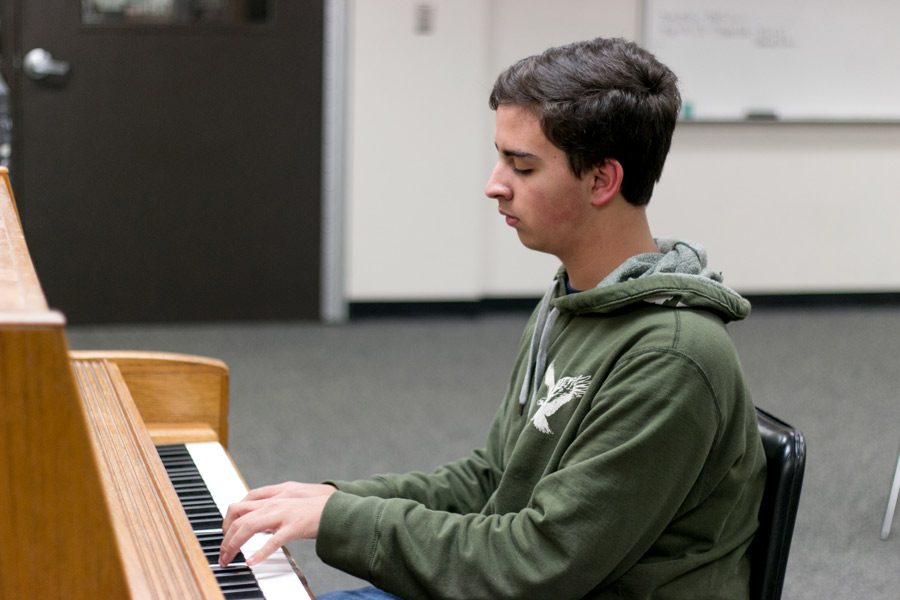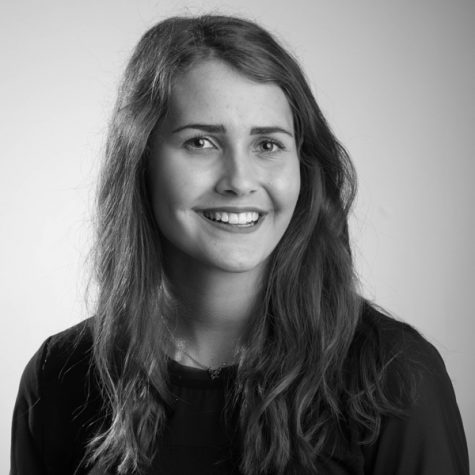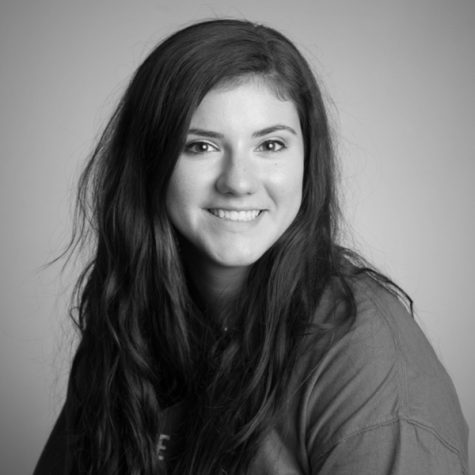Composing emotion
Freshman’s perspective on music allows him to compose unique pieces
Photo by Kayleigh Moreland
Freshman Craig Crawford plays the piano. Crawford has been practicing music since he was 7 years old.
February 9, 2016
He sits down and arranges his music on the stand, trying to calm the frantic rhythm of his heart. The judges give him his cue and suddenly he’s seven again, plinking out a song on a public piano while the right person listens, waiting to tell him he has the talent she’s looking for. Back then he had never dreamed that he would end up here, playing for crowds and judges and introducing his own perspective on the music that inspired him.
Freshman Craig Crawford has been involved in music since age seven, when he started playing the piano. Since then he has learned to compose and plays the saxophone, flute, piccolo, violin, trombone and bassoon, and participates in multiple competitions.
“I started [learning music] when I was seven, but I didn’t really get it then so I had to quit. Originally I was forced into it, so that did not go well,” Crawford said. “But when I got into band in the sixth grade I started picking it up again, and for some reason, between then and now, I got really good. That’s where a lot of that actually started happening.”
Crawford’s music education began when he was noticed by his future piano teacher.
“I was playing a public piano and my piano teacher just happened to be watching,” Crawford said. “She said I had a lot of natural talent and she wanted to fine tune that talent.”
His love for music stems beyond the performance hall. Crawford often composes original pieces or rearranges existing pieces for different ensembles.
“I write a lot of solo literature,” Crawford said. “I like taking piano scores and arranging them for orchestras. I always liked the sound of a symphony orchestra.”
Crawford began composing because he found that he and other musicians didn’t interpret music the same way, and he wanted to show others his own interpretations.
“I don’t necessarily agree with the artistic interpretations of the band directors, musicians,” Crawford said. “I’m motivated to make music because I want to introduce my own perspective on a piece of music. I want that sense of delivering to the listener something transcendental, or compelling them to feel something more than notes.”
Even though his staggering repertoire of instruments may seem difficult to manage, Crawford practices much less than would seem necessary.
“I usually practice 15 minutes a day, just to keep in touch,” Crawford said. “It isn’t that hard for me, it’s just finding time to make sure I do it and make sure it’s still there.”
Crawford participates in all competitions required by the band, such as All Region and Solo and Ensemble. He also participates in a variety of competitions outside school, such as the James Herrin Piano Piano Festival.
“I’ve always done well at All Region, but I didn’t make it this year because I was the first one to go in the audition room,” Crawford said. “James Herrin was the first piano competition I did, and I did pretty well in that. I have a lot of things coming up in the future. I have a gospel music competition, composition competition, and a Federation of Music Teachers competition on Feb, 20, the day after Solo and Ensemble.”
Even though he has the ability, Crawford doesn’t foresee himself pursuing a career in music.
“I don’t think my parents are completely supportive of a career in music, but I could do it,” Crawford said. “I’m going to study music in college anyway.”
Crawford finds that his involvement in music helps him gain self-assurance and cross the boundaries between him and his fellow musicians.
“The competition definitely helps my confidence,” Crawford said. “I have a good way of iterating my thoughts, but I can’t always say what I want to say because it’s social or political things and you don’t always get to voice your opinions at school or at home. But music is like a second language to me and it’s how I try to relate to people. Sometimes, like improv and jazz, that’s how you get to know people that you may have demographic differences with, but your love of music helps you relate to other people.”
Crawford’s main advice for potential musicians is simple: move at your own pace and worry more about the emotion of the music than its technicalities.
“Don’t force it. Forcing it is probably the worst thing you can do,” Crawford said. “Take the time to find somebody who can really help you. It’s not necessarily about getting the notes right, it’s the feeling behind the music that has to be right. If you’re not emotionally invested in it neither is the person listening, and I think that’s the most important part.”
















